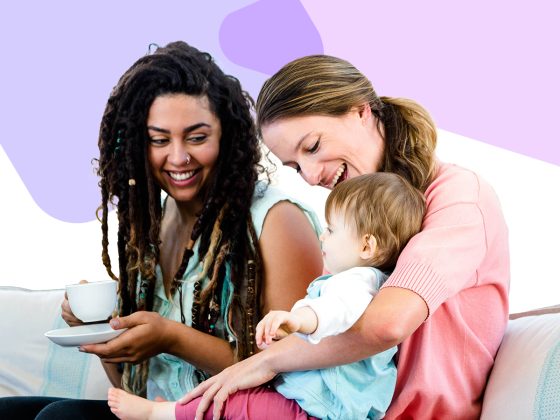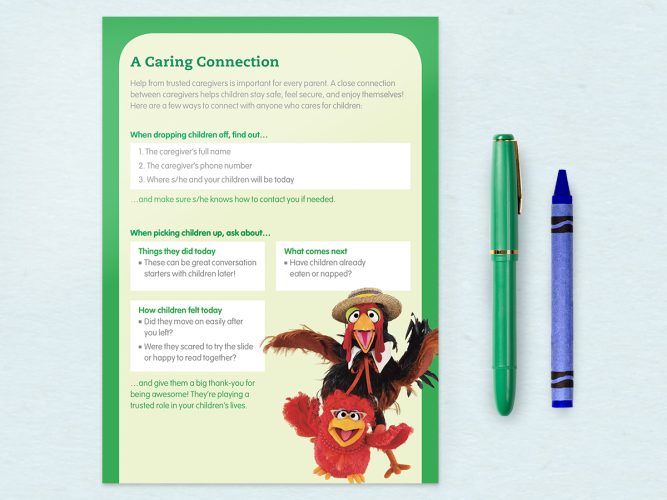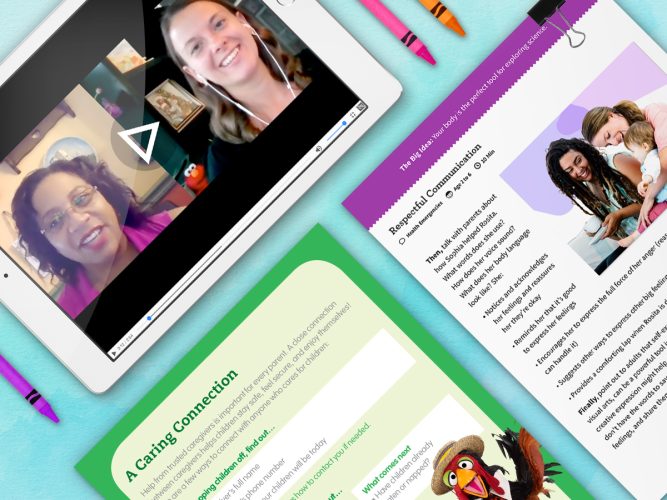
Respectful Communication
Clear communication between parents and caregivers helps children succeed.
Great conversations lead to great collaboration. And when you set up good conversation routines at the beginning of your relationship with parents and caregivers, it makes it easier to have more difficult conversations that might come up later.
Also, when children see grownups having warm and respectful conversations, they learn to have them too!
Positive communication starts with great listening
Listening is the foundation of great communication. It helps you gather helpful information about children and families. Plus, listening shows that you value and respect what others have to say.
To be a great listener, be sure to:
- Assume positive intentions. You all want the best for the children in your care. Even if you disagree on what you are talking about, never forget that you agree on why you are talking: to help children thrive.
- Listen actively. Pay attention to what is being said. Nod, say “uh-huh” and “I see”, and stay focused.
- Pay attention to words and feelings. Don’t just listen to what a parent or caregiver is saying, pay attention to how they are saying it.
- Let the other person finish. Don’t rush to speak. Even if a parent or caregiver seems like they have finished talking, they might have more to say.
- Check for understanding. Before you offer your own thoughts or opinions, make sure you clearly understand what you have heard. Summarize what the parent or caregiver has said by using phrases that start with “What I heard you say was…” or “Am I correct that you’re feeling…”
- Learn more with open-ended questions. Dig deeper by asking questions that can’t be answered with a simple “yes” or “no”. Try starting questions with “Tell me more about…” or “What do you think it means that…”
How you communicate
Every conversation you have with parents and caregivers is an opportunity to build a stronger partnership. How you speak and what you say will help strengthen that collaboration.
To communicate well, be sure to:
- Be open and honest Parents and caregivers want to learn what you have to say about their children. Give accurate information about things that you directly observed.
- Notice and share positives. There are always good things to say about a child, and it is helpful for parents and caregivers to hear what is going well during the day.
- Pause before speaking. Be intentional with your words. Think about both what you are going to say, and how you are going to say it before speaking.
- Ask for input from parents. Parents and caregivers have a deep knowledge of their children, so ask for their ideas. This is especially important when discussing challenges because it puts you all on the same team. You might ask, “Have you noticed this behavior at home? What strategies have been helpful?”
- Talk about concerns when the arise. Parents and caregivers want to work with you, so take care of small issues now before they become big issues later.
There is no one right way to communicate
There are lots of different ways to communicate. Individuals have different comfort levels, and different cultures might have a variety of customs when it comes to communication.
To respect differences, be sure to:
- Follow parents’ and caregivers’ lead. If someone seems consistently uncomfortable with the way you are communicating, try a different approach. And you can always ask how someone wants to communicate.
- Pay attention to body language. A person’s culture might have certain rules and expectations about eye contact, touching, gender roles, greetings and titles, and more. Pay attention to how your parents and caregivers are behaving, and respect their approach.
- Take concerns seriously, even if you don’t share or understand them. Parents and caregivers might express thoughts or concerns that don’t make complete sense to you. Even if you disagree, make sure to treat those feelings with respect and empathy.
Finally, use all the tools you have to communicate. Use email, texts, and phone calls. With some parents, you might schedule more formal meetings. For others, you might rely on quick daily check-ins or written reports.
And definitely communicate about communication. Ask parents and caregivers if they are getting the information they need, and what you might do to improve communication overall.

Social Chat: Communication Between Parents & FFNs
Communication doesn’t have to be complicated—just consistent, caring, and playful!

A Caring Connection
Communication doesn’t have to be complicated—just consistent, caring, and playful!

Communication Between Parents & FFNs: Tips & Tools for Providers
Communication doesn’t have to be complicated—just consistent, caring, and playful!
